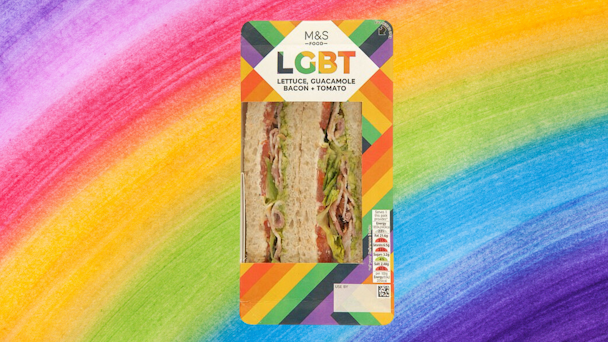It’s time for brands to start tackling injustice – the right way
Is a ‘gay sandwich’ (pictured) or a Pepsi police de-escalation the best brands can do when it comes to social justice? Of course not, explains Collette Philip, founder of Brand by Me.

As a brand strategist specializing in social justice work, I know that the work can’t just exist to create commercial benefits and advantages for brands - it’s about social responsibility, too. That’s because brands pride themselves on being part of society. Of being part of people’s lives beyond a transaction or purchase. They discuss creating meaningful relationships with consumers and talking to us like friends.
As a brand strategist, I know the power of tone of voice, targeting and insight in helping companies achieve this. But even with this intent, a lot can still go wrong.
Even before 2020, the shared but very different experiences of a pandemic and the resurgence of the Black Lives Matter movement made injustice and inequity an everyday conversation. In an increasingly divided society where equity has been politicized to win votes, brands are keen to show that they are part of the solution, not the problem. To celebrate a “diverse,” “inclusive” society and a “greener” world... at least on the surface.
But many of these efforts are, for the most part, superficial. We all remember the infamous Pepsi ad featuring Kendall Jenner. Or L’Oréal’s bold social media claims in 2020 that it stood in solidarity with the Black community and supported speaking out when, just years prior, it had fired trans activist Munroe Bergdorf for doing precisely that. Or, more recently, Fifa’s claim that the 2022 World Cup would be carbon neutral - when, in fact, it was the most polluting one ever. Or HSBC, which was reprimanded by the ASA for its bold “green” claims on ads - failing to mention its transactions to fossil fuel developers that are worth $12bn (£9.7bn to date in the capital, or its responsibility for 65.3m tonnes of CO2 emissions per year.
As Nova Reid, anti-racism activist and educator, puts it so brilliantly, reflecting on “black square summer” in 2020: “I wonder, given that according to Cambridge University Black Voices Report 88% of Black people still experience racism at work, if those declarations of solidarity were more about brand management and being seen to being on the ‘right’ side of history, rather than meaningfully wanting to take steps to address systemic racism and changing workplace culture.”
This ‘slacktivism’ and ‘woke-washing’ by brands is not just lazy and opportunist but deeply harmful. It at once diminishes the complexity of social justice issues while simultaneously distracting from conversations about who is actually responsible and has the power and resources to drive change. And it invites and fuels a public backlash and skepticism around actual social justice work.
However, this doesn’t mean that brands shouldn’t take on wider societal issues - they absolutely should. Nor does it mean that they can’t play a role in driving change. Brands help us navigate the myriad of choices faced by consumers every day. They translate really complicated ideas into simple everyday concepts. And they make ideas and concepts stick in the public consciousness. And these skills are really useful within social justice movements.
Brands absolutely have a role in tackling injustice in wider society. They need to take this role seriously and lead by example - not try to paint over the issues by pretending that they are doing the most - when they create the most harm.
So, what does that mean in practice?
Get your house in order first.
You cannot possibly start tackling societal injustice unless you are tackling inequity and injustice within your company. And no, this doesn’t just mean having a vague DEI statement on your website. It means creating a clear anti-oppression, anti-racism and sustainability strategy backed up by significant and multi-year budgets and being clear that this is a long-term organizational priority. For example, Patagonia’s clothing brand was known for its environmentally friendly focus. But in 2022, on its 50th anniversary, it updated its values to include justice and embed anti-racism and equity into the way it works. It embeds this value at every level - from community project funding to internal initiatives and even hiring decisions (although maybe not at a senior level).
Forget charity, collaborate.
One-off charity donations do very little to create system-level change or challenge the status quo of inequity. Instead, seek and build long-term partnerships with experts from minoritized communities and grassroots movements to help you plan programs for meaningful change and impact. For example, rum brand Wray and Nephew launched Wray Forward, a program to support Black businesses and worked with Black, female-led social enterprise Foundervine to bring it to life. This relationship has been going on for two years to date. And since 2020, the lifeboat charity RNLI has partnered with the Black Swimming Association to help them reach Black communities in its work. These partnerships are examples of strategic relationships between a large brand and a smaller community-led enterprise to create long-term and sustainable impact.
Advertisement
Stop focusing on the business case or your reputation - start thinking about your impact and legacy.
Here’s the uncomfortable truth - capitalism and justice cannot co-exist. Capitalism is a system of oppression that prioritizes making profits above everything and anything else - including people’s rights, safety and health. So, if we are trying to make the business case for justice work, we will fail - simply because there is always a way to save or make more money at the expense of humanity. Likewise, worrying about brand reputation will also lead you away from justice - whether you seek to look good or minimize “risk.”
Risk is always viewed through the lens of the “dominant majority,” meaning that it will always work against minoritized groups (people affected by systems of oppression or “isms”). Take Pride, for example. Pride is a celebration of LGBT+ rights and started as a commemoration of the Stonewall uprising in the US. It is a justice movement, so simply changing your brand colors to a rainbow (or creating a sandwich, ahem, M&S) is both disrespectful and wildly inappropriate. Instead, consider supporting trans rights, like all of these companies who signed UK charity Stonewall’s pledge or Starbucks which partnered with trans charity Mermaids for their 'What’s Your Name' campaign a few years ago.
Progression over perfection.
Before you come back to me on the above examples stating times when the aforementioned brands have and continue to uphold inequity, have backtracked on promises or acted in contradiction to my suggestions, here’s the thing. No brand or company is perfect. No one gets it right all of the time. While it’s really important not to do harm, brands will get things wrong. And that is part of growth and learning. As says my friend and founder of disability-led consultancy business ThisAbility Ltd, Sulaiman Khan, “Progression over perfection.”
Perfectionism is impossible and simply delays or stops action altogether. So, commit to learning and moving forward, even imperfectly.
Advertisement
Finally, it’s really important that you do all of these together, not in isolation. This is not Highlander ('Where there can only be one'). As marketers and brand leaders, we are VERY comfortable with multi-tasking. Why would this be any different?
Brands have power, and with this power comes a responsibility to our world. This means fighting for justice. It is possible. It is necessary. And as climate activist Mikaela Loach says, “It’s not that radical.”
Collette Philip is founder of social justice-focused brand consultancy Brand by Me.

